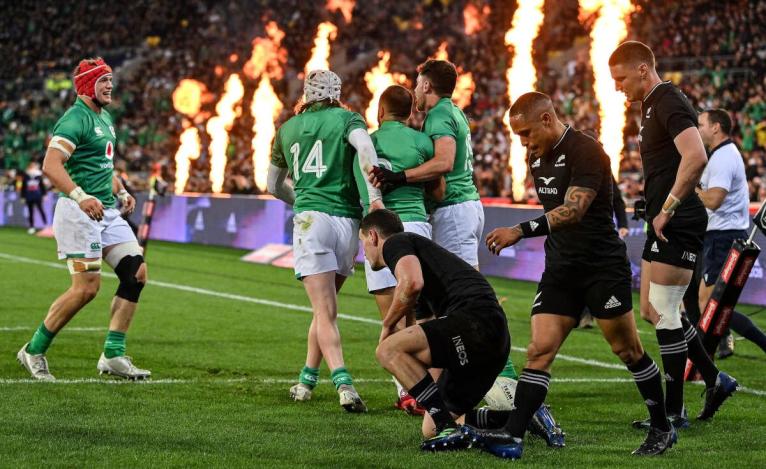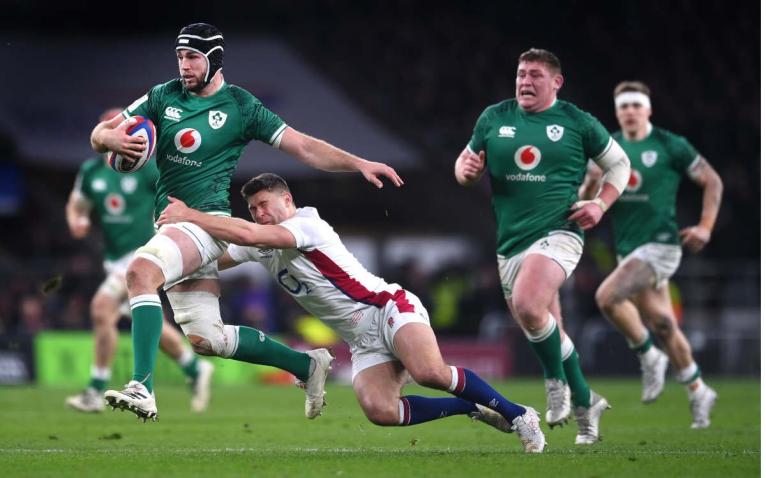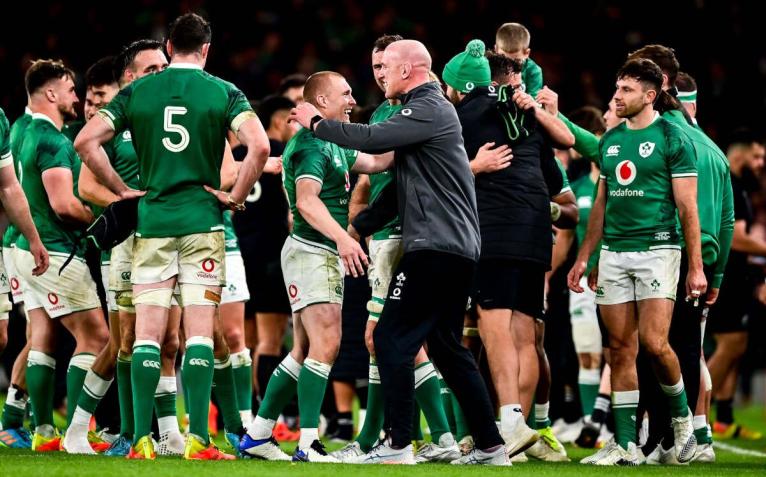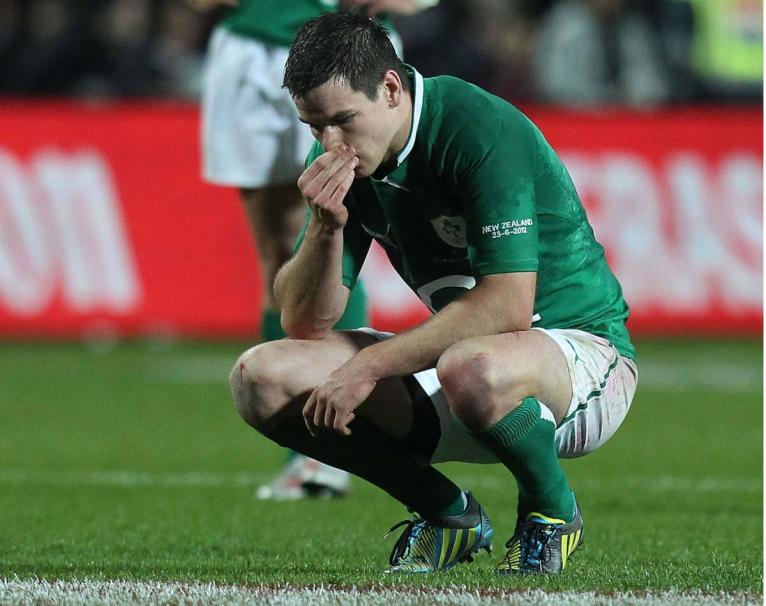The old stager was moving slowly, watching his step, the applause of a crowd drowned out by upbeat music blaring from the sound system.
On the walls, memories. A giant screen showed pictures of the man from a different time, when his hair was brown and curled rather than shaved; when every step he took was a forward one. The man ignored the siren images, choosing instead to retain eye contact with the MC. At 62, Philip Mathews is still strong and fit, radiant under the spotlight.
The reason he was up there was because Ireland’s Rugby Writers were granting the former British and Irish Lion a lifetime achievement award, prompting questions from the MC about a career that brought a Triple Crown in 1985, appearances in the first two World Cups, regrets, glory, despair, pride.
“Now we’re beating New Zealand, South Africa and Australia away; winning grand slams, do you feel we’ve won people’s respect?” the MC asked.
Mathews stared back at him, pausing briefly for dramatic effect. “More important than that, we finally have self-respect,” he replied. “For years we didn’t. But now… now we believe we can do anything.”
Belief was the underlying theme of Ireland’s tour to New Zealand this summer. It started the day they arrived, Andy Farrell calling a team meeting, asking his playing squad one question. “Do you think you can win here?”
Every player nodded. But Farrell wasn’t finished speaking, saying they should set loftier ambitions. “We want to win the series,” Farrell said to his squad.
“Not one of us had any doubts,” Tadhg Beirne would later say.
Years ago just about every single Irish player would have had plenty. You think of a similar question that the then Ireland coach Warren Gatland posed to his 1999 World Cup squad just before that tournament began. “Who here feels we can win it?”
Keith Wood was the only one to raise his hand.
That’s why this summer’s tour victory over the All Blacks, masterminded by Farrell, deserves to go down as the biggest achievement in Irish rugby.

For context, look how rarely touring teams have won down there, Australia (twice), South Africa once (1937), France once (1994), the British and Irish Lions once (1971).
This summer, five (successful tours) became six.
Who’d have believed that before Farrell, Sexton et al left Ireland? Who’d have believed it after they lost their first two games of the tour, to the Maori All Blacks in Hamilton, then to New Zealand at Eden Park?
More to the point who’d have believed it when Will Jordan ran away from Sexton to touch down in the right-corner on 61 minutes of the third Test to turn a 22-3 half-time deficit into a more manageable 25-22 gap?
Previous Irish teams would have folded. But this one didn’t. And the signs have been there to suggest they wouldn’t. We just weren’t paying enough attention to notice them.
Farrell talked about how he wanted everyone to lead, not just the old warhorses, Johnny Sexton and Peter O’Mahony. Words turned into actions that night in Wellington. This game was won in the mind as well as on the pitch.
Let’s revisit Twickenham in March. England had levelled things up approaching the final quarter. Ireland emptied the bench and rattled up score after score from that moment on to record their biggest away win in London.
What about Paris a month before? The French appeared to be out of sight at half-time; Ireland recovering to take the game to the wire, losing by just six. Then this time last year, when Ireland hosted the All Blacks in Dublin, they were 10-5 down at the break but ended up outscoring New Zealand by 14 points in the second half.
Now back to the deciding test of the summer. Outscored 19-3 in 20 second-half minutes, listening to the roars of ‘All Blacks, All Blacks’ rolling down from the stands, missing Ronan Kelleher, Garry Ringrose and Jacob Stockdale, Ireland fought back.
A few days earlier, Farrell had talked about how he wanted everyone to lead, not just the old warhorses, Johnny Sexton and Peter O’Mahony. Words turned into actions that night in Wellington, this game won in the mind as well as on the pitch.

“Well, the psychological side of the game is something that we’ve worked on strongly since the last World Cup,” Sexton said afterwards, pointing out how these things don’t change automatically but how last November’s appointment of a high performance coach, Gary Keegan, has had a noticeable impact.
“Look, it’s not long ago that we were being written off, so coming back from that shows fortitude as well,” Sexton said. “It would be amazing to go and pick out some of the articles that were written about us, about me, in autumn 2020. That keeps us grounded.”
So does their coach.
He’s perceived as hard-nosed, Farrell, but first and foremost, he’s an empathetic, emotionally-intelligent chap. “One of the best communicators in rugby,” suggests Gatland, who worked with Farrell on two Lions tours.
“Our coaches are world class. We believe in what they are saying. Like, when we come in at half-time in games, they see what needs fixing. They tell us, getting the message across in concise points.”
Caelan Doris, Ireland No 8
Yet his ability to put an arm around a player’s shoulder is not the main reason Ireland have gone from seventh to first in the world rankings over the space of 19 months.
You could say Paul O’Connell’s addition to the coaching ticket has been central to that change, the Munster man’s expertise having the dual benefit of freeing up Simon Easterby to concentrate solely on the defensive aspect of his job spec. As those parts of Ireland’s game began to function more efficiently, so too did a shift in selection policy, the starting XV loaded with Leinster players, their familiarity with one another transferred onto an international stage.
Also from Leinster came a playbook, which attack coach Mike Catt wisely adopted while adding a few of his own tweaks.
“Our coaches are world class,” Caelan Doris, the Ireland No 8 said. “We believe in what they are saying. Like, when we come in at half-time in games, they see what needs fixing. They tell us, getting the message across in concise points.”
There’s evidence to back up Doris’ point. Across the last 14 games, Ireland have been outscored just once in the second half, their coaches showing an ability to fix issues on the hop.

“We have had a clean slate going out in the second half of games, having more awareness around what the opposition are doing, and that’s down to our coaches,” Doris said before explaining how much of the mental coaching coming from Keegan – a former Olympic boxing coach – focuses on ‘staying in the moment’. SUMO, short for Shut Up and Move On, is the new catchphrase in Irish rugby.
“Andy (Farrell) is an unbelievable speaker,” Doris said, “an unbelievable motivator but he is well able to whittle the message down to a few points and get us on track.”
That precise point was one Gatland also made in his Daily Telegraph column this summer, the former Wales Lions coach praising Farrell for his concise messaging and passionate delivery.
We heard it for ourselves when he spoke to the Irish travelling Press in the Jerry Collins Stadium just outside Wellington before the third test, Farrell bringing us out of the clubhouse where we were gathered to show us where Collins’ childhood home was. Later, when asked about the need to remain disciplined, he quietly pointed out how the laws of the game are a bit like the weather; you may not like them, you still have to live with them.
After winning the decisive Test in the summer, O’Mahony recalled Ireland’s previous tour to New Zealand, which ended with a harrowing 60-0 loss. So much has changed since, Ireland have won five of their last eight games against the All Blacks.
“Some teams play on the edge; we like to keep a low penalty count,” he said.
It seemed a minor point. But again an examination of the record books backed up his assertion. Across the last 16 games, Ireland’s penalty count has gone north of 10 on just three occasions. They’ve had two sin-binnings in their last eight games; their opponents six. Ireland haven’t had a sending-off since Bundee Aki’s dismissal against England 18 months ago; their opposition have had three red cards in the last six matches.
That sums them up now. Fitter, more disciplined, mentally stronger, Farrell may be using several of the same faces that he selected 18 months ago – but they’re a different team.
You hear that from Peter O’Mahony, the veteran Munster man, who now has flecks of grey in his beard, but who you sense is cherishing every moment as his career moves from summer to autumn. It was only last November when he said that month was the most enjoyable of his career, a point which carried greater weight as O’Mahony spent those weeks on the bench, fighting for his place.

From being the weakest Tier 1 nation in world rugby at the tail end of the last century, they’ve risen to No 1 in the world.
But that’s the easy part.
We can praise their coaching team, point to their recent results, admire their improved mental fortitude but you can’t ignore the obvious flaws.
If Sexton goes, who is there to replace him? Remember, their most recent three defeats have coincided with Sexton being on the field for just 31 minutes of those games. For Sexton at flyhalf, read Tadhg Furlong at tighthead.
Even when Furlong has been there, Ireland’s scrum has creaked against the physically bigger packs, France and England, the one flaw in Farrell’s selection policy being his reluctance to cap specialist scrummager, Marty Moore.
Depth issues are also visible at loosehead, second row and full-back, and you only have to think back to the 2015 World Cup quarter final, when injuries struck down Sexton, Paul O’Connell, O’Mahony and Jared Payne, to realise that a good team can win a tour but it takes a great squad to lift the Web Ellis Cup.
We’ve eight matches between now and March, let’s try someone else at fly-half in five of those. Let’s not run the risk of being in another World Cup quarter final with Johnny Sexton injured, wondering if his replacement can learn on the job.”
Darren Cave, former Ireland centre
Conscious of this, Darren Cave, a member of that 2015 squad, spoke on Irish television on Monday about the need to make selection sacrifices between now and next October at the expense of results. “We’ve eight matches between now and March, let’s try someone else at fly-half in five of those,” said Cave. “Let’s not run the risk of being in another World Cup quarter final with Johnny Sexton injured, wondering if his replacement can learn on the job.”
If we have moved on from then, if we truly have self-respect, well, now is the time to show it, to risk a negative result this November, as well as next season’s Six Nations, to find out if Moore can hack it as a starting Test tighthead, if Joey Carbery, or even the emerging Jack Crowley, are able to shift from co-pilot to captain.
Each of the previous World Cup winners were prepared to make those calls and if Ireland have any chance of joining rugby’s list of immortals they’ve two choices. Pray for a clean bill of health in a year’s time or risk a painful defeat this month. If history has taught us anything, the suffering will inevitable come at some point. Better now than then.


I think the belief really started after the 2013 ABs Ireland game where Crotty scored that last minute try.
A year later, one of the Irish in a post game interview after beating the Springboks said something about “we believed we could beat the joint best team in the world”.
The Springboks were 2 at the time, All Blacks were number 1.
But that was a telling statement, they didn’t see the All Blacks as the pinnacle anymore but another team that Ireland could beat on any day.